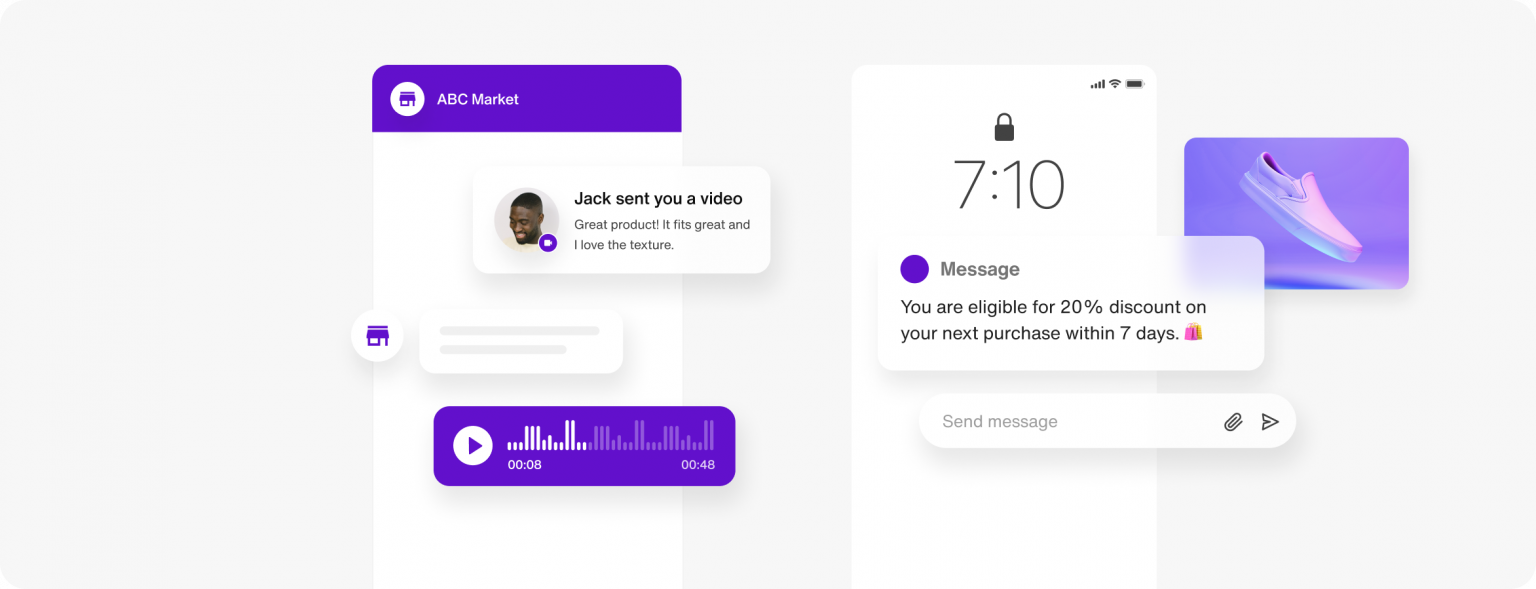Taking customer relationships to the next level with in-app messaging

Think about the last time you connected with a friend.
It was most likely using a messaging app on your mobile device, where you exchanged messages at your own pace and the conversation flowed freely with memes, GIFs, photos, and links.
In-app messaging makes the customer relationship personal by allowing businesses to connect to users with relevant purchasing information, support, or promotions.
In-app messaging also creates a user-to-user, social+ connection that builds users’ relationships within your brand.
Driven by a handful of monopolies like Facebook, Tencent, and Apple, messaging apps are now the primary way people communicate. In the blink of an eye, messaging apps have left all other communication channels in the dust, from phone calls to emails to SMS. In some cases, they have even surpassed face-to-face interactions.

What is in-app messaging?
In-app messaging is a text-based conversation that typically occurs on a mobile device via messaging apps like Facebook Messenger, Instagram, or WhatsApp.
In-app messaging lets people send or receive messages from anywhere, anytime.

What are the preferred communication channels of modern customers?
Why do brands choose in-app messaging?
In-app messaging uniquely allows people who do not share the same physical space to interact in very lifelike ways. It is personal, friendly, quick, easy, and rich in emotion. It lets users connect at their own time, lets them know when to engage, and keeps the context alive — creating a persistent and shared conversation between users that they can come back to again and again.
It’s no surprise that messaging has taken over so fast.
In-app messaging provides an opportunity to bring the customer relationship closer to the business.
We’re entering a new era in business-to-customer communication. Read our new ebook.
The evolution of customer communications
Advancements in communications technology have accelerated how businesses connect with customers in deeper, more meaningful ways. Every communication channel over time has enabled a more immediate and connected experience.
- Telephone
- Social media
- SMS
- Messaging apps
- Web chat
Businesses have used each of these tools to reach new audiences and reinforce relationships with customers. Maybe your brand sees more support conversations over social media than web chat, so you developed a support Twitter account.
Or maybe your email marketing drives more conversions than your SMS strategy, so you spend more time developing email campaigns than text alerts.
For modern businesses, in-app messaging has become a way to reimagine the customer experience. As a fully-owned customer communications channel, it fits what the current consumer is looking for in their app experience.
Sendbird believes messaging conversations within your mobile app will be the next frontier of relationship building and personalized customer interaction. It is the one medium that promises to achieve the holy grail for businesses: delivering personal experiences at scale while driving business goals.
Acting on the opportunity, a wave of innovative brands — ranging from PayPal to Virgin Mobile to Walgreens — have already started to build customer conversations in their apps that look and feel like the back-and-forth messaging we do with friends.
Following on the popular Venmo model, PayPal evolved their peer-to-peer payments experience to include messaging to make the act of paying a friend more fun and social.
Virgin Mobile created a messaging-powered support channel in their app that made asking for help as easy as messaging a friend.
Walgreens created a secure space for patients and coaches to continuously converse with one another for as long as necessary until patients feel comfortable taking on the world.
These brands are utilizing the potential of in-app messaging conversations to connect with customers personally, deepen their relationships and provide a modern, unique brand experience.
You can start driving higher engagement and better customer relationships with Sendbird’s feature-rich and flexible chat platform in minutes, but first, let’s understand why in-app messaging has taken over customer communications.
Why in-app messaging wins over other methods of business communication
Given a choice, most businesses want a personal, engaging, and convenient way to communicate with their customers but they don’t have the right tools for it. They’re stuck with old communication channels such as SMS, email, and live chat, which can feel unidirectional, impersonal, and disjointed.
Limitations of SMS, email, and live chat
- SMS: With SMS, it is hard for users to know the sender’s identity — making communication feel impersonal and difficult to trust. SMS has also become rife with phishing scams, raising concerns over its effectiveness, especially when expecting users to tap on links.
- Email: Average email click rates have dropped to 1.39%, forcing marketers to think about new channels to reallocate their acquisition spending. As a channel for support, email is too slow. If a customer interacts with a brand through a web form and is redirected to an email with a 24-hour response SLA, that customer is experiencing friction and will go to a competitor who provides a faster experience.
- Live chat: With live chats, there is the expectation of agents to always be ‘live’ — putting a huge burden on your business. On the other hand, if the customer gets distracted during the chat, they might get disconnected.
Putting the diminishing effectiveness of these channels aside, customers receive business communication over different channels, making it hard to track business communications and thus adding friction — creating a tedious customer journey.
And every new step in the customer journey gives customers an option to abandon it.
Power your in-app messaging with Sendbird Chat API
Sendbird transforms all customer communication across the customer journey into powerful and personal messaging conversations that customers can easily access inside your app.
Every touchpoint feels personal, easy, and connected.
Accelerate every stage of the customer journey within your app today. Try a Sendbird demo.











